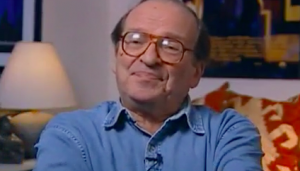Remembering Sidney Lumet
Director Sidney Lumet has died at the age of 86. The Archive of American Television interviewed him in 1999 about his work in television. The full interview is available at http://emmytvlegends.org/interviews/people/sidney-lumet
Excerpts from the interview:
On being an actor’s director
I think because I was an actor myself, I know what they’re going through. The process of acting is extremely painful. I know that doesn't sound logical to most people, but all good work is self-revelation. That’s true for performing artist as well. And actors, the only instrument they’ve got, it’s not a violin, it’s not a piano, it’s not just their bodies, the way a dancer is, there’s no disguise. That’s them up there. And the better they are, the most of themselves they’re using. That process of self-revelation is extremely painful. I understand that process. If I can help them to feel any more secure, and any more unafraid of releasing whatever part of themselves they have to, I understand that I can help them that way. And they feel that. I don’t even have to articulate it
On directing the feature film Network
It’s a peculiar movie. Everybody keeps saying, ‘oh God, what a brilliant satire.’ Paddy and I keep saying, what satire? It’s sheer reportage. Everything that was discussed about television in that movie has happened, except we haven’t killed anybody on the air yet. That’s the only thing that hasn’t happened. Deliberately. But other than that, everything has happened, news as entertainment.
On his advice to aspiring directors
Work wherever you can. It doesn't matter what. A documentary, a commercial. Wherever you can get near a camera, especially if you’re a director. You’re not going to be a director until you put your eye into that finder. And it doesn't matter what. There’s no such thing as good work or bad work. There’s only work, at the beginning. Until you’ve got enough under your belt technically, and have your legs under you. It’s like learning to walk, you need all of it. Learn those lenses. To hell with the zoom lens, it’s not going to teach you anything. Bad lens. Visually it doesn't help you tell anything. And the zoom lens lies, because it doesn't relate to the eye, you see. Doesn't do what the eye does. Because, if you notice, on the zoom lens, the background moves as well as the foreground. As well as me getting bigger, that’s getting bigger behind me. That doesn't happen with your eye. So it’s basically telling you a lie visually, to begin with. That’s why prime lenses are still, in my view, the heart of any visual medium.
Full Archive interview description:
Sidney Lumet was interviewed for three-hours in New York, NY. Mr. Lumet spoke of his work as an actor on the stage before he became a director in television. He recalled his work on the television series Danger(1950-55), and You Are There(1953-57) both “live” dramatic shows of the time. He discussed the use of blacklisted writers on these shows and how the material they wrote often reflected the era of McCarthyism. He also discussed other television dramatic anthology series he directed for including Omnibus, Goodyear Playhouse, The Alcoa Hour, Studio One, and Kraft Television Theatre. He described his direction of the well-known television special The Sacco-Vanzetti Story and The Play of the Week: “The Iceman Cometh” both of which aired in 1960. He spoke of his transition to a feature film director with “12 Angry Men” in 1957 and his work on such other feature films as the Paddy Chayefsky’s satire, “Network” (1976). The interview was conducted by Dr. Ralph Engleman on October 28, 1999.

